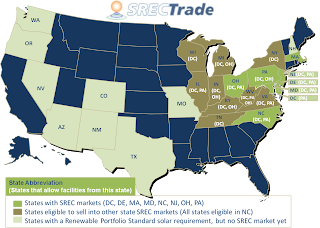What are RECs?
Renewable Energy Certificates (Credits) are tradable energy commodities that represent the clean component of generating 1 MWh of electricity from renewable sources. |
| From: Scalo Solar Solutions |
Why do RECs exisit? or "Fund it and it will come"
States across the country have passed Renewable Portfolio Standard (RPS) bills over the past few years. RPS's have come about because the people have demanded that a portion of their electricity should come from clean energy sources. RPS percentages vary across the country. In Illinois, we have a requirement to generate 25% of our electricity from renewable energy by the year 2025 (1). Most of our electricity comes from coal and nuclear power and there has been a rising movement to shift some of this generation capacity to better energy sources. Wind, Solar Electric, Landfill Gas, Biomass, Hydroelectric, and Biodiesel are all technologies that qualify for RPS goals.RECs are the "currency" that states use to meet their RPS. If a 1 MW PV farm gets installed in Chicago, then the owner of that PV farm can sell about 1,200 RECs to Illinois to help it meet its RPS goal for the year.
Illinois consumes about 136,000 MWh of electricity per year (2) so would need about 6,800 MWh of renewable energy to meet RPS goals for 2011 (5%). Since Illinois current generates only 735 MW of renewable energy, Illinois is forced to buy RECs from sources outside the state. If you view RECs as a stimulator for renewable energy which also stimulates jobs, cleaner water & air, university research, and energy independence, then Illinois is exporting millions of dollars to fund other states clean energy goals. If you fund renewable energy (with RECs), clean energy will be installed.
What are SRECs?
In the Chicago PV farm example above, Solar RECs (SRECs) are RECs that come from solar energy systems. Certain states have created special solar carve outs in their RPS bills to mandate a small percentage of their RPS to be met by solar technology specifically. |
| From: SRECTrade.com |
Why Solar Water Heaters should qualify as SRECs generators?
Solar water heaters (SWH) are different from solar electric systems (PV) in that SWH converts sunlight to heat while PV converts light to electricity. SWH systems reduce the energy required to heat up water for cleaning, bathing, and cooking in our homes just as PV reduces the energy required to power our lights, TVs, appliances, computers, etc. PV qualifies for meeting RPS goals because PV energy has been easy to measure and track where SWH has been more difficult to quantify. This is no longer the case however due to the Solar Rating and Certification Corporation (SRCC). This group now measures the energy output of a complete SWH system in a particular area and publishes this data on its website. In Chicago, a 2-panel solar water heater can produce 2,680 kWh worth of energy in a year which would equate to 2.7 RECs.My contention is that since this SWH production data is independently verified, it should serve as a basis to qualify SWH systems as SREC generators. SWH systems are a robust, cost effective way for a property owner to reduce their energy consumption with clean energy. SWH adoption is scalable in that systems can be installed very quickly and work at almost any property. Lots of local jobs would The state would also benefit by keeping its clean energy investment dollars local and continue to pay dividends for the years ahead. Some areas have already begun to allow SWH systems to generate SRECs towards their RPS (NC and DC); I hope that more follow suit in the coming years.
_____________________________________
(1) RPS data from DSIRE
(2) Illinois energy facts from StateMaster.com
Good information from SRECTrade.com came out today about current SREC prices. 254 solar thermal systems were registered as SREC generators at the end of March 2011. There is a precedent for counting solar water heating towards state RPS goals.
ReplyDeletehttp://www.srectrade.com/blog/srec-markets/solar-capacity-in-the-srec-states-march-2011
Maryland is getting into the game: http://www.atissun.com/blog/3835/maryland-renewable-energy-credits-solar-water-heating-systems/
ReplyDeleteIts always good to have tips on good blog posting. As I just started posting comments for blog and faced a lot of rejections. I think your suggestion would be helpful for me. I will let you know if this works for me.
ReplyDeletesolar water heating
Nice Info! Most of people believe that home solar panel systems are eventually going to replace fossil-fuel based power sources as the way that many people power their homes.
ReplyDeleteHigh Efficiency Solar Cells | Solar Energy Canada